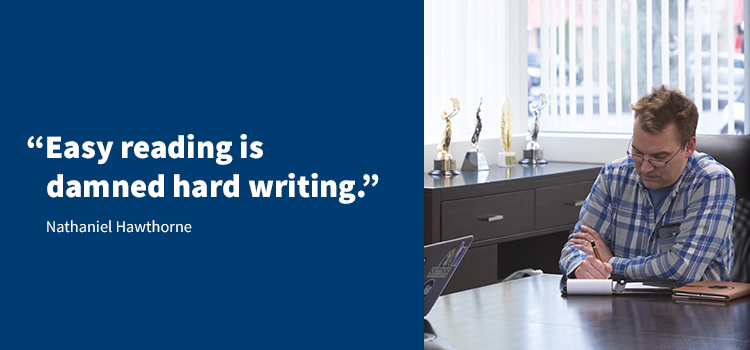A previous version of this blog was published as an article in New Hampshire Business Review.
Most people can tell the difference between the skills of a recreational tennis player and those of Roger Federer. And everyone understands the difference between a house painter and a portrait painter. But it’s not always easy to see how the skills of a professional copywriter differ from the writing skills of the average businessperson.
Part of the problem is that copywriters try to make reading simple and easy. When they succeed, this makes readers assume the act of writing is also simple and easy. But, as Nathaniel Hawthorne once said, “easy reading is damned hard writing.”
What could be so hard about writing copy? Well, a few things. Here are some of them.

Composing with purpose
Copy professionals compose in ways that tempt readers to read. They use headings, subheadings, captions, bullets, and other compositional elements in ways that make their writing easy to skim and more likely to be read.
They also strategically omit secondary messages to make key messages stand out. By saying less, they prevent the common marketing problem of too many messages producing too much noise for the signal to be heard.
Controlling voice
Good writers deliberately control voice—or the personality their writing suggests. To understand differences in voice, think of the different personalities conjured up by the copy on a bottle of craft beer versus most investment firm copy.
Word choice (diction) has a big effect on voice. The words “purchase” and “utilize,” for example, can create a stuffy, formal voice. Whereas “buy” and “use” suggest a more conversational, casual narrative personality. Good writers choose words deliberately to control voice.
Applying the rules (and breaking them)
Professional writers master the rules of punctuation, capitalization, syntax, and so forth, and generally apply them to their writing for the sake of clarity, precision, and gaining reader confidence. But pro writers also know how and when to disregard the rules—to produce better, more effective writing than the rules allow for.
Ferreting out the unintended
When we write, we often reveal personal biases, faulty assumptions, subjective realities we’ve mistaken for objective truth, and so on. Unintended messages and meanings distract and annoy readers and interfere with communication.
No writer completely controls all that he or she reveals. But the pros of prose are more aware, and they edit their own work repeatedly (sometimes ad nauseam) to eliminate the unintended from their writing.
Channeling the audience
Good writers are hyper-aware of their target audience and the circumstances under which that audience is likely to encounter the writing. A good copywriter channels the intended audience, gaining a nearly firsthand sense of the meaning readers are likely to take from the copy. This allows them to adjust nuances for maximum effect.
Using the right tools
Good copywriters know how to create and use messaging documents and writing style guides to write volumes and volumes of copy and keep it all on strategy, on message, and on brand.
Now you know
Those are just some of the things professional copywriters do when they write. They’re things that make writing a more difficult and time-consuming activity than you might first think it is. And things that result in copy that’s more likely to inform, persuade, and make readers act.